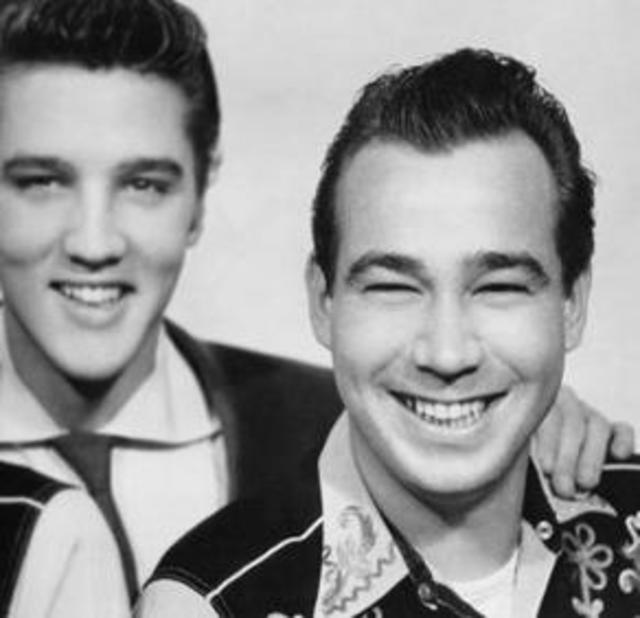Bill Black

Bill Black (bass; born September 17, 1926, died October 21, 1965)Bill Black was a participant in a major event in the evolution of rock and roll: the recording of Elvis Presley's first single for Sun Records on July 5, 1954. On that day, Presley – along with bassist Black, guitarist Scotty Moore – spontaneously broke into a rocking arrangement for "That's All Right," a blues song by Arthur "Big Boy" Crudup. Black slapped the bass strings, providing the rhythm to go along with the blues, and the chemistry between the three musicians helped launch Presley's career and the rock and roll revolution. The flip side, a rollicking cover of Bill Monroe's "Blue Moon of Kentucky," came from Black, who began playing it as Elvis and the others fell in. Elvis Presley's singles for Sun were jointly credited to "Elvis Presley, Scotty and Bill." Later, Elvis's sidemen were renamed "the Blue Moon Boys."At the time, Moore and Black were both members of a hillbilly band called the Starlite Wranglers. Moore had made contact with Sam Phillips, owner of Sun Recording Studio, and Phillips thought of him when he wanted to test out Presley as a singer. Though he didn't bowl over either Moore or Black at an impromptu audition at Moore's home in Memphis, Phillips wanted to hear how the three of them would sound on tape – and the rest is history.Black remained with Presley through 1958. During these years, Presley went from reserved truck driver to charismatic "Hillbilly Cat" to hip-swiveling superstar. All the while, Black's string-popping bass and infectious personality were on display wherever Presley played, from small-time shows all over the South to the breakthrough TV appearances following Presley's signing to RCA. Black's bass was an important element in the skeletal arrangement of "Heartbreak Hotel," Presley's first single for RCA. Black switched from standup bass to electric bass at the 1957 session for "Jailhouse Rock," making him one of the first to play a Fender Precision on a rock and roll recordingBlack and Moore first parted ways with Presley in September 1957 over disagreements about money. They had been put on a modest salary – by Col. Tom Parker, Presley's manager - while Presley's income was skyrocketing. For a two-week period, they were out of the band and Presley looked for replacements, but both sides relented and they were rehired at a higher per diem.After leaving Presley for good in 1958, the bassist became a bandleader in his own right, forming a group that was known both as Bill Black's Combo and the Bill Black Combo. Recording for Memphis-based Hi Records, they charted an impressive 19 instrumental hits on Billboard's Hot 100 between 1959 and 1965. These included "Smokie – Part 2" (Number 17 pop, Number Four R&B), "White Silver Sands" (Number Nine pop, Number Four R&B) and a remake of Presley's "Don't Be Cruel" that reached Number 11.Like many instrumental outfits of that time, the Bill Black Combo had a danceable country-soul sound built around saxophone, organ, guitar, drums and Black's driving bass. They called it "the untouchable sound." Bill Black died of a brain tumor in October 1965 at the age of 39, but the combo continued without him, playing into the Eighties.